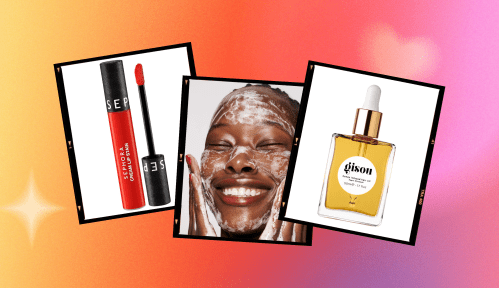With the 2020 WFH whirlwind plus a serious family illness, this past year transformed me into a living, breathing five-foot-nothing ball of stress (and I know I’m not alone).
If you’re right there with me—whether it’s work, relationships, or, you know, the world—you know that feeling of wanting to try just about any happy lamp or gummy in the name of relief. And that’s just when I was introduced to Fitbit Sense, the advanced health smartwatch that features a combo of innovative sensors to measure your stress, sleep, heart health, and more to give you a 360-degree look at your wellness—especially stress, the area that really needed work.
This. Is. Major. I previously never gave Fitbit a shot, since I figured it was only for fitness-y people who wanted to track their 10,000 steps and heart rates—but there’s so much more to it (also, I now love tracking those aforementioned things, too). Off the bat, this watch looked super sleek on my wrist and was easy to set up even with my grandma-level tech skills. So, yes, already winning.
But the real test came down to how it helped me better manage my stress situation. And here’s the bottom line: Knowing how your body’s responding to stress can change your mindset in ways I didn’t think were possible.
Keep scrolling for a closer look at my experience wearing this advanced health smartwatch and why I don’t plan on taking it off.
How Fitbit’s Stress Management Score works
When you wake up, open the Fitbit app to see your Stress Management Score, which gives you insight into how your body is handling stress. The score ranges from one to 100, with higher numbers showing less physical stress and vice versa (so remember, high is good).
Where do those numbers come from? Three factors affect your score: responsiveness, exertion balance, and sleep patterns. And with my Fitbit Premium membership, I got access to dive deeper into these individual scores. Responsiveness is how your body reacts to stress, so my watch measured how my autonomic nervous system (ANS) responded throughout the week. On a scale from zero to 30—higher numbers meaning lower signs of a stressed-out ANS—I scored a 20, which gave me a burst of confidence (wait—maybe I can do this).
Exertion balance looks at how much you’re exercising, which can help reduce your stress. To determine that, the watch checks out your steps, daily activities, and fitness level. I scored a 29 out of 40, which is on the lower side, but rang true with my personal experience over the last few months. Knowing that my movement routine could use a tune-up helped to validate my feelings and give me a concrete goal to set my mind to.
And finally the sleep patterns: Most of us know by now that lack of quality sleep negatively affects stress—and Fitbit Sense looks at your total sleep and restfulness over the past week to calculate your score. And guess what? This stare-at-the-ceiling pro scored a 26 out of 30, which means I’m actually getting better shut-eye than I realized.
All of these numbers go into creating your final Stress Management Score, which for me was, drumroll please… a 75 out of 100. I’ve been an A/B student my whole life, so this C+ didn’t feel great—but it was still higher than I anticipated. The good news? I knew what areas of my life I had to focus on.
How it can help
Once I knew how my body was dealing with stress, it was time to start acting on it. That was made easier because I could also see how my body was responding to stressful situations: Since your body responds to stress with sweat, Fitbit Sense features an EDA (electrodermal activity) sensor that measures tiny sweat microbursts with electrical micro-currents. Yes, this is as futuristic as it sounds.
Meanwhile, the stress management tile in the Fitbit app lets you add reflections on how you’re feeling throughout the day, so you can easily identify activities that are stress triggers as well as ones that feel like self care. I find this feature super helpful, because it gives me a guidepost to look back on as I’m progressing.
And on the days I feel especially bleh, I head to the mindfulness tile, where I’ve already tried a slew of good-for-me tools like yoga, guided breathing exercises, and meditating (which I now love). No, my stress hasn’t magically disappeared overnight—but with the progress I’ve already made (plus my sheer nerdy excitement to boost my scores), this watch isn’t coming off my increasingly relaxed wrist any time soon.
Top photo: Fitbit
Sign Up for Our Daily Newsletter
Get all the latest in wellness, trends, food, fitness, beauty, and more delivered right to your inbox.
Got it, you've been added to our email list.





